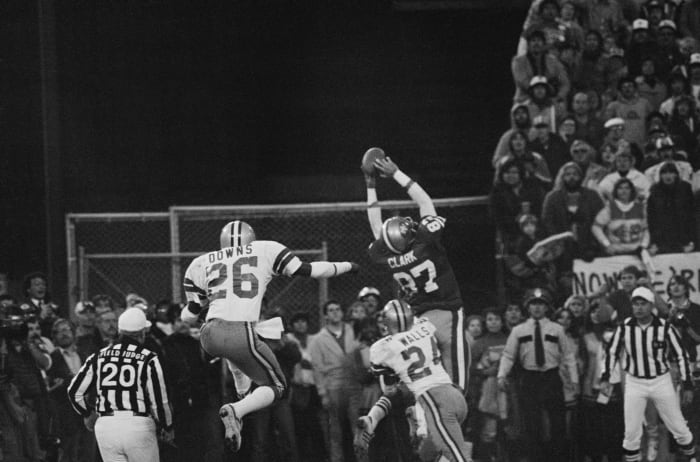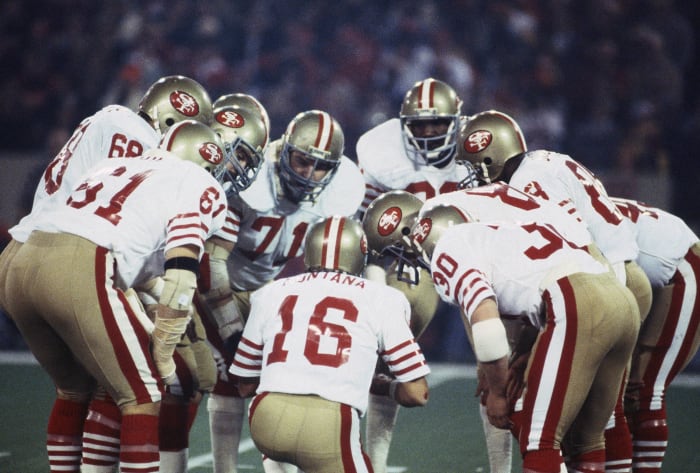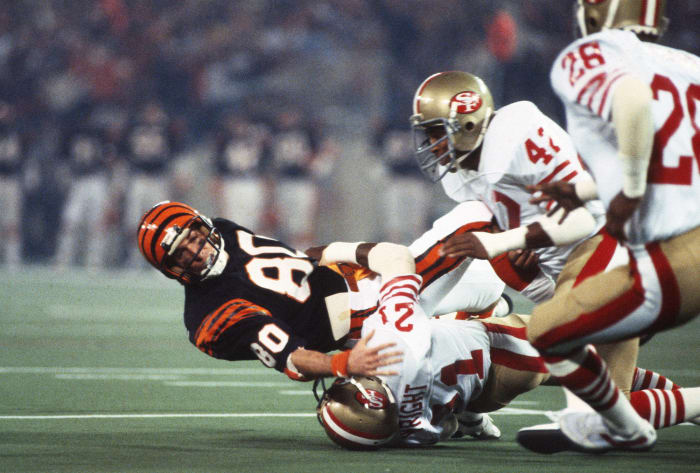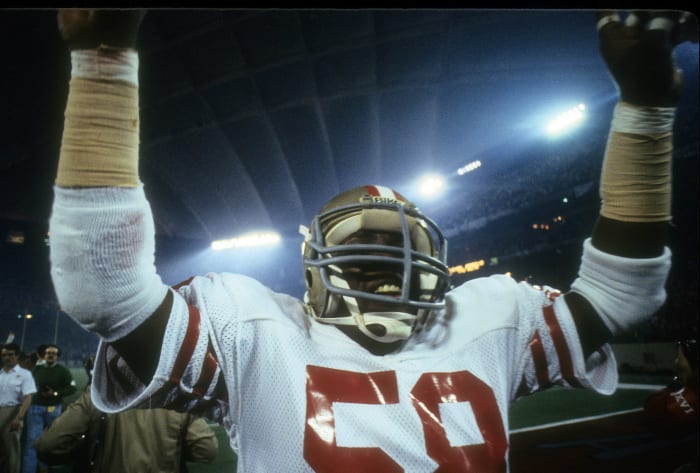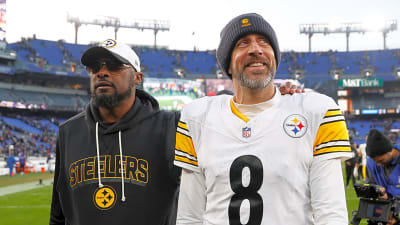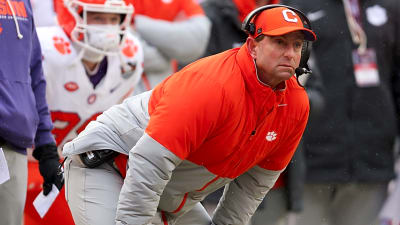Super Bowl XVI tends to get forgotten against the history of the big game. It was before the event grew to its current form and it didn't have the thrilling highlight package that some games provide. The site of the game, the Pontiac Silverdome, wasn't the most picturesque of settings either. And though the game would spark the San Francisco 49ers dynasty, it is the least revered of their five Super Bowl championships.
With this being the 40th anniversary of Super Bowl XVI, it seems to be a great time to look back at what made this game one of the most-watched events in American television history.
1 of 20
Niners needed "The Catch" in the NFC championship game
Getty Images
The one play that comes to mind of the 49ers Super Bowl run didn't happen in the Super Bowl. In the NFC championship game, Joe Montana's six-yard touchdown pass to Dwight Clark with 58 seconds left gave San Francisco a 28-27 win over the Dallas Cowboys. "The Catch" is one of the most memorable plays in NFL history and is viewed as the play that catapulted the 49ers dynasty while simultaneously ending the Dallas Cowboys' run.
2 of 20
Bengals won the "Freezer Bowl"
Wally McNamee/CORBIS/Corbis via Getty Images
While the 1982 NFC Championship game is known for a play, the AFC Championship was known for the conditions it was played in. The temperature in Cincinnati for the game was -9 degrees, but due to 27 mph winds, the windchill measured -59. The conditions of the "Freezer Bowl" slowed down the San Diego Chargers' "Air Coryell" offense that featured Hall of Famers Dan Fouts, Kellen Winslow, and Charlie Joiner. While no player is used to -59 degree conditions, San Diego played the previous week in 88-degree weather in Miami and the Bengals used the weather as strategy all game (they elected to play defense at the beginning of both halves so they have the winds at their back. Cincinnati won 27-7 with the Chargers' players admitting that the condition greatly affected their play.
3 of 20
First time since Super Bowl III that both teams were first timers
George Gojkovich/Getty Images
It's actually pretty remarkable that Super Bowl XVI is only one of four times in 56 years where both participants were making their first Super Bowl appearance.
The first time it happened, obviously, was Super Bowl I when the Packers beat the Chiefs. The Packers repeated as champs the following season, making the Jets-Colts meeting in Super Bowl III the next time two first-timers met in the Super Bowl. It magically didn't happen again until Super Bowl XVI when the San Francisco 49ers met the Cincinnati Bengals.
Four years later, it happened when the Chicago Bears met the New England Patriots in Super Bowl XX. And then ... that's it. It hasn't happened in the 36 Super Bowls since. Unless we get the Lions facing the Texans, Browns, or Jaguars in the title game ... or it the NFL expands again ... we won't see it again.
The Bengals had missed the postseason the previous five seasons -- finishing in 4th place in the AFC Central the three previous years -- before reaching the Super Bowl. The 49ers had missed the playoffs eight straight years before their Super Bowl run. In fact, they had consecutive 2-14 seasons in 1978 and 1979.
After the game, the Niners would go on to win five Super Bowl championships over the next 15 seasons (including four in a nine-year span). The Bengals, however, had a fairly successful run in the 1980s -- even getting a rematch with the Niners in Super Bowl XXIII -- but have yet to win its first Super Bowl. In fact, Cincinnati just ended a 31-year drought between playoff victories.
4 of 20
49ers and Bengals met late in the regular season
Focus on Sport/Getty Images
The Bengals and 49ers knew each other pretty well before their meeting in Super Bowl XVI. The two met in Week 14 of the regular season in Cincinnati with the Niners winning handily, 21-3. Joe Montana threw two touchdowns and rushed for another one ... foreshadowing their Super Bowl clash where Montana threw and rushed for scores.
The Bengals, who led the league in fewest turnovers, turned the ball over six times in this game. In Super Bowl XVI, Cincinnati gave it away four times.
5 of 20
First northern Super Bowl
George Gojkovich/Getty Images
Super Bowl XVI was the first Super Bowl to play in a northern location or a cold-weather city. The game was played at the Pontiac Silverdome just outside of Detroit, which means the weather would not affect the play on the field but it did affect everything outside. It was -4 degrees a week before the Super Bowl and it didn't get much warmer as the week wore on. While it didn't snow the day of the game, snow and ice fell in the area during the week which led to nightmare traffic conditions where fans even left their rides to walk to the stadium. Fans and media complained about the conditions all week and jokes were made at the city's expense. The Super Bowl wouldn't return to a northern city until 1992 when Minneapolis hosted it in the Metrodome and wouldn't return to the Detroit area until Super Bowl XL.
6 of 20
Second Super Bowl to be played outside of the "Big Three"
George Gojkovich/Getty Images
Not only was Super Bowl XVI played in a cold-weather city for the first time, but it was also just the second time the game was held outside of the trio of Miami, New Orleans, or Los Angeles area. Five of the first 15 Super Bowls were held in Miami; five were held in New Orleans; four were held in the Los Angeles area (two in the Coliseum and two at the Rose Bowl in Pasadena).
The lone wolf to that point was Super Bowl VIII in Houston's Rice Stadium, which marked the first time the Super Bowl was held at a venue that wasn't the home of an NFL team.
7 of 20
Joe Montana's first Super Bowl
Focus on Sport/Getty Images
Joe Montana was a solid quarterback at Notre Dame but wasn't one coveted by NFL scouts. He was drafted in the third round and backed up Steve DeBerg during his rookie season. He would eventually take over the starting job in Week 7 of the 1980 season, lost it, and then won it back in Week 13.
He entered 1981 as the unquestioned starter and led the Niners to a 13-3 regular-season record, including winning 12 of their final 13 games. He led the league in completion percentage but threw only 19 touchdowns and 12 interceptions. Montana would go on to win four Super Bowls in a nine-year period of the 1980s while winning two MVP awards and three Super Bowl MVPs. Until Tom Brady (who grew up idolizing him) came along, Montana was one of the popular picks for GOAT and still gets mentioned in those sorts of debates.
His first championship was Super Bowl XVI where he completed 14 of 22 passes for 147 yards, a passing touchdown, and a rushing touchdown.
8 of 20
Bill Walsh used to coach the Bengals
Focus on Sport/Getty Images
Bill Walsh joined the 49ers the same time Joe Montana did. He brought his West Coast Offense to the NFL where he would win three Super Bowls in 10 years as San Francisco's head coach. He got his NFL start for one year as the Oakland Raiders running backs coach before joining Paul Brown with the AFL expansion Cincinnati Bengals in 1968. The Bengals quarterback at the time didn't have a strong arm and the team used a lot of quicker and shorter passes.
When Brown retired in 1976, he promoted line coach Bill Johnson to replace him as head coach and Walsh promptly resigned. In the years that followed, Walsh claims Brown sought to blackball him from getting an NFL head coaching job. After a season as the San Diego Chargers offensive coordinator, he got the head coaching job at Stanford University. Two years later, he moved thirty minutes north to the 49ers.
Two of Walsh's three Super Bowl championships were at the expense of Paul Brown's Bengals.
9 of 20
Forrest Gregg becomes first Super Bowl head coach to also play in one
Ross Lewis/Getty Images
Forrest Gregg took over Cincinnati in 1980 and quickly turned the franchise around. He set a record when he led the Bengals to Super Bowl XVI by becoming the first person to play in a Super Bowl and then be the head coach of a Super Bowl team.
Mike Ditka, Dan Reeves, Sam Wyche, Tony Dungy, Ron Rivera, and Gary Kubiak also achieved that feat.
Gregg was a Hall of Fame offensive tackle for the Green Bay Packers during their 1960s dynasty and won Super Bowls I and II. He also won Super Bowl VI with the Dallas Cowboys in his final season. He would retire in 1971 and took on assistant coaching jobs before becoming head coach of the Cleveland Browns for two and a half seasons. He spent four seasons with the Bengals, going 32-25 with the 1981 season being his best in the Queen City. He left the Bengals to take over the Packers in 1984. He spent four years in Green Bay before leaving to try to resurrect his alma mater SMU after they received the death penalty.
10 of 20
Walsh and Montana got stuck in traffic
Fred Larson/San Francisco Chronicle via Getty Images
We mentioned the bad weather in the Detroit area during Super Bowl week, well it nearly cost the Niners two of their most important pieces from getting to the game. Both head coach Bill Walsh and quarterback Joe Montana, among others, were stuck on a bus in traffic trying to get to the Silverdome on game day. The road conditions were poor and, naturally, traffic is bad trying to get to the Super Bowl site ... but something else gummed up the roads. Vice President George H. W. Bush's motorcade was causing even more issues.
While on the bus, Walsh joked that he called the stadium and saw that the equipment manager was coaching the team and that they were up 7-0.
The bus arrived at the stadium about 90 minutes before kickoff. Montana led the Niners down the field for a touchdown ... and a 7-0 lead.
11 of 20
First Super Bowl where the team with the most yards lost
Focus on Sport/Getty Images
Super Bowl XVI was the first Super Bowl where the team who gained the most yards lost the game. The Cincinnati Bengals gained 356 yards of offense to the San Francisco 49ers' 275, but also committed four turnovers -- two of which were in the red zone.
The next time a team lost a Super Bowl despite gaining more yards? The Pittsburgh Steelers in Super Bowl XXX. The last time it happened? Last year, when the Kansas City Chiefs gained 10 more yards but lost to the Tampa Bay Buccaneers.
12 of 20
San Francisco's goal line stand
Focus on Sport/Getty Images
Every Super Bowl has that defining moment that people remember as they look back. Super Bowl XVI's moment was the 49ers goal-line stand in the third quarter. The Bengals offense had been able to move the ball all game but turnovers and untimely mistakes kept them from scoring. Cincinnati finally broke through with an impressive 83-yard touchdown drive to open the second half, making their deficit 20-7. Later in the quarter, the Bengals drove again and were set up with a 1st-and-goal on the San Francisco 3-yard line.
1st down: Running back Pete Johnson gained two yards to the Niners' 1-yard line.
2nd down: Johnson again got the ball, but was stuffed by the Niners' defensive line, losing a yard.
3rd down: Quarterback Ken Anderson faked a handoff and threw to Charles Anderson in the flat. Anderson had to beat linebacker Dan Bunz in the open field for the touchdown, but Bunz was able to tackle him before he reached the goal line.
4th down: Cincinnati handed the ball off to Johnson again, who was stuffed by Ronnie Lott and Jack Reynolds for no gain. The Bengals' drive was stalled and momentum shifted.
In hindsight, this was a key moment in the game. San Francisco's offense had grown ineffective and the Bengals would score a touchdown on the following drive. The goal-line stand -- especially Bunz's hit -- was crucial to keep the lead and, ultimately, the win.
13 of 20
Dan Ross sets receiving record
Nate Fine/Getty Images
Bengals tight end Dan Ross set a Super Bowl record with 11 receptions ... which accounted for 104 yards and two touchdowns. His 11 catches were matched by Jerry Rice, Deion Branch, and Wes Welker in later Super Bowls. Denver's Brandon Marshall broke that record with 13 grabs in XLVIII. James White broke Marshall's record with 14 catches in Super Bowl LI. New England's Shane Vereen matched Ross' 11 catches in Super Bowl XLIX.
14 of 20
Ronnie Lott and Cris Collinsworth were rookies
Focus on Sport/Getty Images
Ronnie Lott (#42) and Cris Collinsworth (#80) were rookies in Super Bowl XVI. Lott would go on to have a Hall of Fame career as a feared safety who was an 8-time All-Pro and four-time Super Bowl champion. Collinsworth had a nice NFL career with three Pro Bowl appearances, a first-team All-Pro selection in 1983 and book-ended his career with his final game coming in Super Bowl XXIII against the Niners. San Francisco cornerback Eric Wright was also a rookie.
Collinsworth is much better known for his 30+ year career as a broadcast analyst for NBC, Fox, and HBO's Inside the NFL. He is currently the color commentator for NBC's Sunday Night Football. Collinsworth has also broadcast four Super Bowls and will be the color commentator for this year's Super Bowl. Lott also went into broadcasting, first as part of Fox NFL Sunday in the mid-90s and then with the Pac-12 Network.
Speaking of broadcasters from that game, linemen Randy Cross and Dave Lapham also had successful careers in the booth.
George Gojkovich/Getty Images
Montana won the Super Bowl's MVP ... but could kicker Ray Wersching have been more worthy? Wersching made all four of his field-goal attempts, though three were chips shots under 30 yards. He made both his PATs as well. Sure, that doesn't sound like MVP level importance but what he did on kickoffs may have been.
He kept kicking squibs on kickoffs which caused all sorts of issues for the Bengals' return team. Cincinnati fumbled two of the squib kicks, including one that the 49ers recovered. Bill Walsh felt the squib kicks would take wild bounces off the astroturf. On the Niners' second kickoff, the Bengals struggled to field the ball and ended up beginning the drive on their own two-yard line. With the Niners up 17-0 with 15 seconds left in the first half, Wersching's squib kick was fumbled away by Archie Griffin and recovered by the Niners inside the 5-yard line. Wersching lined up for a field goal and San Francisco went into halftime with a then-record 20-0 lead.
The kickoffs were a subplot all game. On the opening kickoff of the game, Jim Breech kicked the ball out of bounds for a penalty. After backing up five yards for the re-kick, the Niners' Amos Lawrence fumbled the ball and the Bengals recovered.
Bruce Bennett Studios via Getty Images
The Bengals entered Super Bowl XVI with the fewest turnovers in the NFL. San Francisco committed the second least amount of turnovers. Yet the game began with a fumble by San Francisco's Amos Lawrence on the opening kickoff. A few plays later, Ken Anderson was picked off by Dwight Hicks.
That was the first of several killer turnovers by Cincinnati. The Hicks interception was near the Niners' endzone. In the second quarter, Cris Collinsworth caught a pass at the Niners' 5-yard line and then fumbled it away (that play would've been an incomplete pass in today's game). Archie Griffin fumbled a kickoff and gave the ball to the Niners in field goal range.
17 of 20
Keena Turner's chicken pox
Focus on Sport/Getty Images
Niners' linebacker Keena Turner played the NFC Championship game and Super Bowl XVI with chickenpox. Turner, who was in his second NFL season, contracted chicken pox two days before San Francisco's NFC title game showdown with the Dallas Cowboys. He was ill during Super Bowl week and lost weight. He even had his teammates calling home to their parents to make sure they had already contracted chickenpox as kids. All these years later and Turner still has the scars (and a Super Bowl ring) to show for his time in Pontiac.
Turner played 11 seasons -- all for the 49ers -- and won four Super Bowls.
18 of 20
John Madden's first Super Bowl as a broadcaster
Focus on Sport/Getty Images
Super Bowl XVI was the first Super Bowl with John Madden in the broadcast booth. Madden, along with Pat Summerall, called the game for CBS and introduced a wide audience to his Telestrator ... which was dubbed "CBS Chalkboard". The Telestrator was revolutionary at the time to help color commentators easily diagram replays to help fans understand what happened ... and Madden was the master at using it.
Madden won Super Bowl XI as the head coach of the Oakland Raiders and go on to call 11 Super Bowls as an analyst, calling at least one Super Bowl for CBS, Fox, ABC, and NBC.
19 of 20
Largest Nielsen ratings in Super Bowl history
Focus on Sport/Getty Images
Super Bowl XVI has the largest Nielsen rating of any sporting event in history. The 49ers win over the Bengals drew a 49.1 rating, tops among Super Bowls, and the fourth highest-rated show of all time. Only the M*A*S*H finale, the "Who done it" episode of Dallas, and the eighth part of the Roots miniseries hold a higher rating.
20 of 20
Silverdome became a massive crime scene
Nikki Kahn/The Washington Post via Getty Images
In the postgame clean up after the game, cleanup crews uncovered around 500 wallets thrown about the stadium and bathrooms. It was estimated that around $200,000 in cash and hundreds of credit cards were stolen from those wallets by a pickpocketing ring. Two arrests were made at the time the story broke, but it was estimated that about 50 people were involved.
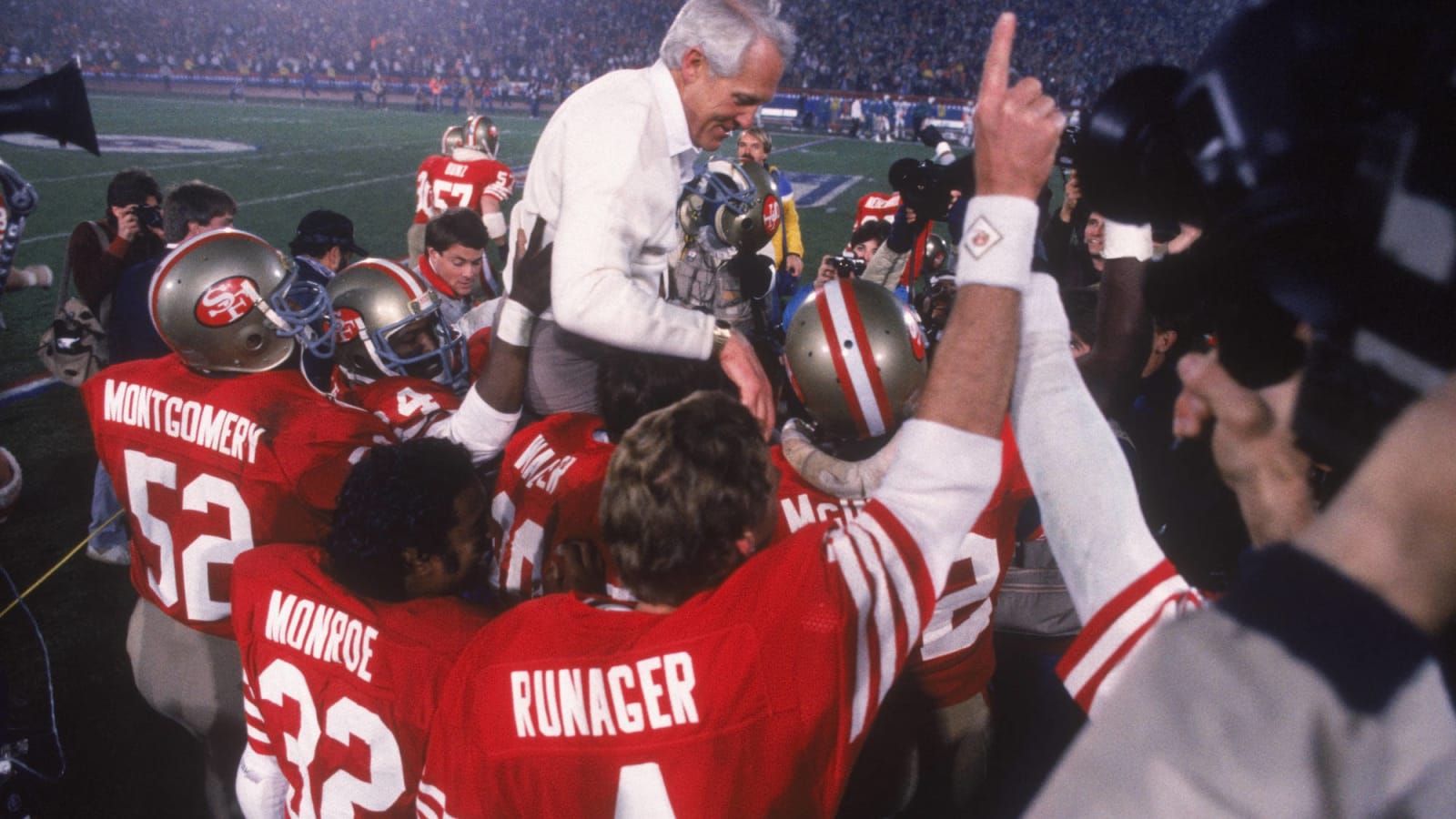
 +
+
